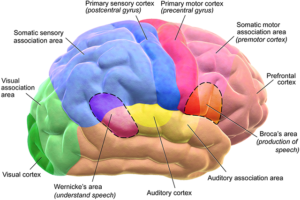Cognitive Decline – Definition
Cognitive Decline is the term used to define natural, age-related loss of mental function. It is distinctly different from disease-related mental impairment. Unfortunately, even though cognitive decline is not as bad as Alzheimer’s Disease or loss of mental function cause by Traumatic Brain Injury, it is nevertheless something most of the population will face as they get older.
 Symptoms of Cognitive Decline
Symptoms of Cognitive Decline
Most people are familiar with symptoms of cognitive decline through contact with an aging relative who might otherwise seem normal. These symptoms might include:
-
Memory problems (May occur with short, medium or long term memory)
-
Difficulty finding the right words for things
-
Attention deficit (greater than normal difficulty in conversational focus and ability to follow a conversational thread)
-
Disorientation (When familiar surroundings seem unfamiliar or when people might seem familiar but social context is lost)
- Becoming overwhelmed by making decisions, listening to instructions.
- Impulsiveness and/or poor judgment.
Impacts of Cognitive Decline
Normal Cognitive Decline accompanying the onset of aging can cause problems with family and friends, but can have serious consequences in the workplace. This is quite unfortunate, since the very “old timers” that have been with a company the longest and have a comprehensive understanding of policies, procedures and the history of development (the “brain trust” of the company) lose their grasp on these very things and can eventually cause economic impacts within a company unless managed correctly.
Remedies for Cognitive Decline
Fortunately, Cognitive Decline can be mitigated in a variety of ways. Several dietary and lifestyle changes can help reduce age-related cognitive decline:
- Switch from a western diet high in simple sugars and saturated fats to a Mediterranean diet high in mono- and polyunsaturated omega-3 fats, fiber, and polyphenols
- Caloric restriction may improve learning and memory
- Cognitive stimulation and training, including playing chess and speaking more than one language, can enhance cognitive reserve and convey protection against loss of brain function
- Exercise is known to increase levels of brain-derived neurotrophic factor, which can lead to enhanced cognitive function
- Moderate alcohol consumption (up to 2 drinks/day) and caffeinated coffee consumption (~3 cups/day) may convey protection against cognitive decline
Dietary Interventions:
- Fish Oil: Daily omega-3 supplementation was independently associated with a dramatic reduction in cognitive decline over a 1.5-year period in an aging study population.
- Phosphatidylserine: Human clinical trials have found that supplementing with phosphatidylserine improves cognitive function in aging subjects with cognitive impairment.
- Glyceryl Phosphoryl Choline (GPC): Patients taking GPC showed neurological improvement and relief of clinical symptoms of chronic cerebral deterioration that was superior or equivalent to that obtained with prescription drugs.
- Acetyl-L-carnitine: A meta-analysis of data from over 21 studies shows that supplementation with acetyl-L-carnitine improves cognitive deficits observed during aging and pathological brain deterioration.
- Huperzine A: Patients with Alzheimer’s disease improved their scores on standard cognitive tests after supplementing with huperzine A.
Causes & Risk Factors for Cognitive Decline
Several risk factors have been shown for non-Alzheimer’s related cognitive decline:
- Diabetes
- Smoking
- High blood pressure
- Elevated cholesterol
- Depression
- Lack of physical exercise
- Infrequent participation in mentally or socially stimulating activities
Many factors contribute to age-related cognitive decline:
- Oxidative stress and free radical damage
- Chronic low-level inflammation
- Declining hormone levels like estrogen, testosterone, DHEA, pregnenolone
- Inner arterial lining (endothelium) dysfunction
- Insulin resistance
- Excess body weight
- Suboptimal nutrition
- Loneliness, lack of social network, and high stress
